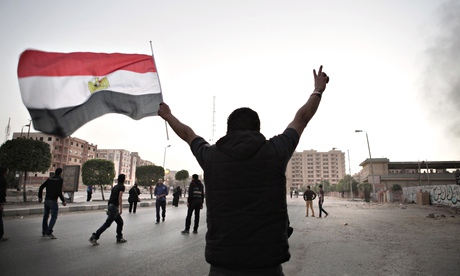 The government of President Abdel Fatah al-Sisi has cracked down on the Islamist movement in the past year. Photograph: Gary Calton For The Observer[/caption]
The government of President Abdel Fatah al-Sisi has cracked down on the Islamist movement in the past year. Photograph: Gary Calton For The Observer[/caption](Reuters) - An Egyptian court on Saturday dissolved the Freedom and Justice Party (FJP), the political wing of the banned Muslim Brotherhood, dealing a crippling blow in the campaign to crush Egypt's oldest Islamist movement.
A court banned the Muslim Brotherhood itself in September, but that ruling did not mention its political wing, leaving open the possibility it could be allowed to run in parliamentary elections, due late this year.
Saturday's supreme administrative court ruling excludes the Brotherhood from formal participation in electoral politics, potentially forcing the movement underground, particularly as it has lost the sympathy of large swathes of the public.
The court's ruling called for the FJP to be dissolved and its assets seized by the state. Its decision is final and cannot be appealed, a judicial source said.
The FJP's lawyer called the ruling political and said it was unconstitutional to deprive the defense of the right to appeal. "The legal reasons given do not justify this ruling but this is a political decision to get rid, not just of the Freedom and Justice Party, but of all the parties that were established after the revolution of January 25, 2011," lawyer Mahmoud Abou al-Aynayn told Reuters.
"I expect other parties to be dissolved too." The Muslim Brotherhood, once Egypt's oldest, best organized and most successful political movement, has seen hundreds of its members killed and thousands detained since then-army chief Abdel Fattah al-Sisi overthrew elected president and Brotherhood member Mohamed Mursi 13 months ago, following weeks of protest.
Mursi, who ruled for a year, and other Brotherhood officials were rounded up in the wake of his ousting and hundreds have been sentenced to death in mass court rulings that have drawn criticism from Western governments and human rights groups.
Sisi, who went on to win a presidential election in May, vowed during his campaign the Brotherhood would cease to exist under his rule.
CLAMPDOWN
The FJP was established in June 2011, in the aftermath of the uprising that removed Hosni Mubarak from power after 30 years and inspired hopes for more pluralistic politics in Egypt.
It went on to win parliamentary and presidential elections, but many Egyptians became disillusioned with Mursi after he gave himself sweeping powers and mismanaged the economy, taking to the streets in protest and prompting the army move against him.
But the leading lights of the 2011 uprising, many of them secular youth activists, have also found themselves on the wrong side of the new political leadership, many of them receiving long sentences for breaching a new anti-protest law by taking part in small and peaceful gatherings.
The government accuses the Brotherhood of inciting violence and terrorism. Egypt's state and private media now portray the Brotherhood as a terrorist group and an enemy of the state.
The Brotherhood maintains it is a peaceful movement but attacks by militants have risen since the army overthrew Mursi.
Most of the violence has taken place in the Sinai Peninsula near the border with Israel and the Hamas-run Gaza Strip. The army has responded with air and ground attacks.
By Reuters
The Iran Project is not responsible for the content of quoted articles.











